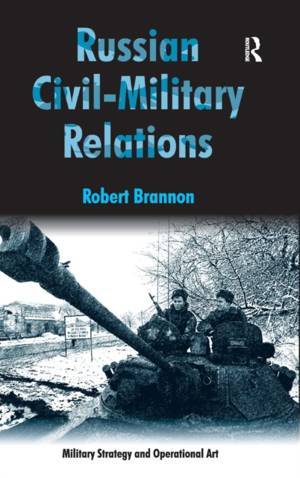
- Afhalen na 1 uur in een winkel met voorraad
- Gratis thuislevering in België vanaf € 30
- Ruim aanbod met 7 miljoen producten
- Afhalen na 1 uur in een winkel met voorraad
- Gratis thuislevering in België vanaf € 30
- Ruim aanbod met 7 miljoen producten
Zoeken
Omschrijving
Putin's style of leadership has transitioned into another era but there is much still inherited from the past. In the often anarchic environment of the 1990s, the nascent Russian Federation experienced misunderstandings and mis-steps in civil-military relations. Under Boris Yeltsin it has been questioned whether the military obeyed orders from civilian authorities or merely gave lip service to those it served to protect while implementing its own policies and courses of action. Robert Brannon sets forth the circumstances under which the military instrument of Russia's power and influence could be called upon to exert force. Deriving in part from its Soviet past, the author examines how Russia's military doctrine represents more than just a road map of how to fight the nation's wars; it also specifies threats to national interests, in this case the United States, NATO and international terrorism. Against this background of politics and power, the military's influence may reveal as much about politics as it does the military.
Specificaties
Betrokkenen
- Auteur(s):
- Uitgeverij:
Inhoud
- Aantal bladzijden:
- 352
- Taal:
- Engels
- Reeks:
Eigenschappen
- Productcode (EAN):
- 9780754675914
- Verschijningsdatum:
- 28/03/2009
- Uitvoering:
- Hardcover
- Formaat:
- Genaaid
- Afmetingen:
- 156 mm x 234 mm
- Gewicht:
- 671 g

Alleen bij Standaard Boekhandel
+ 580 punten op je klantenkaart van Standaard Boekhandel
Beoordelingen
We publiceren alleen reviews die voldoen aan de voorwaarden voor reviews. Bekijk onze voorwaarden voor reviews.







